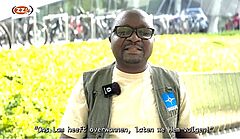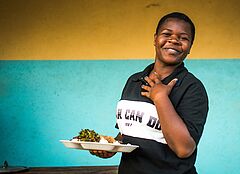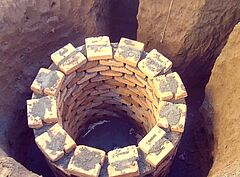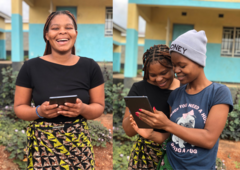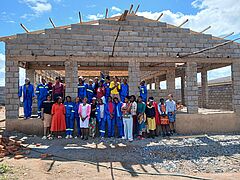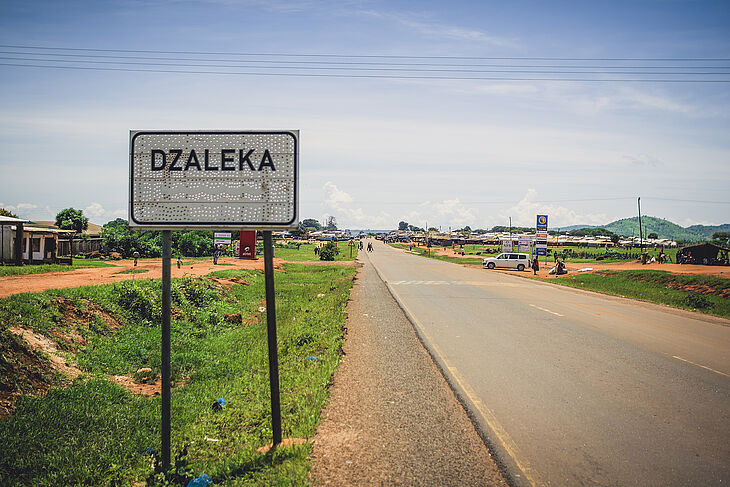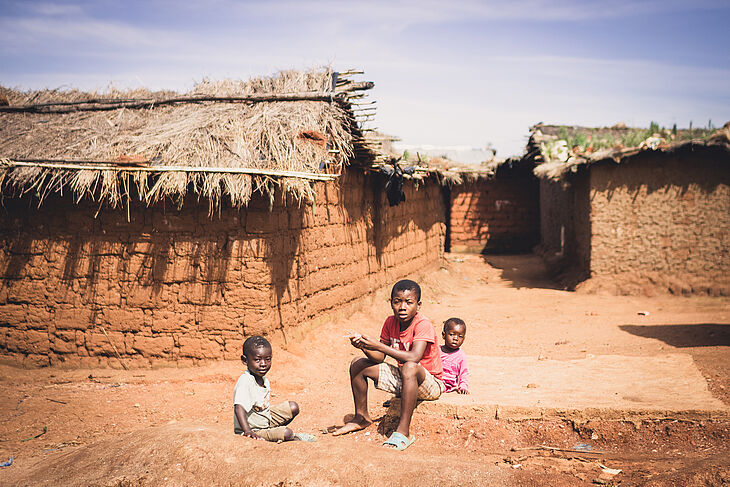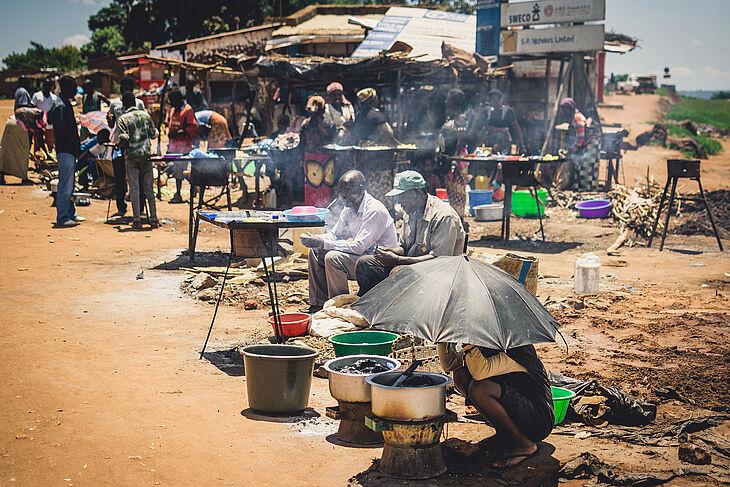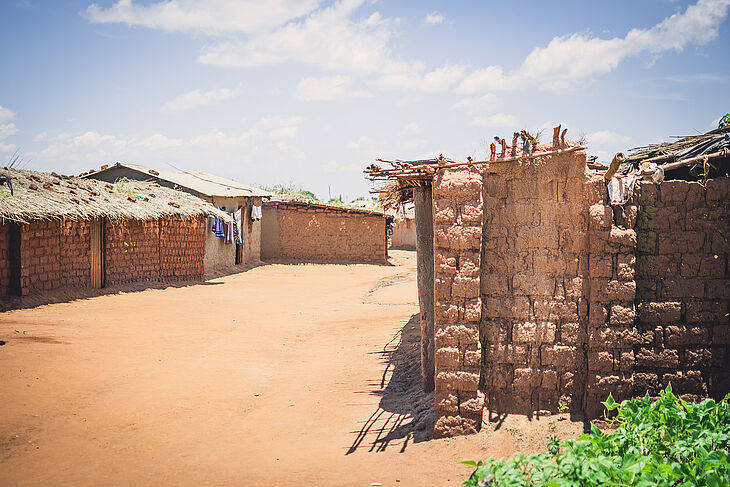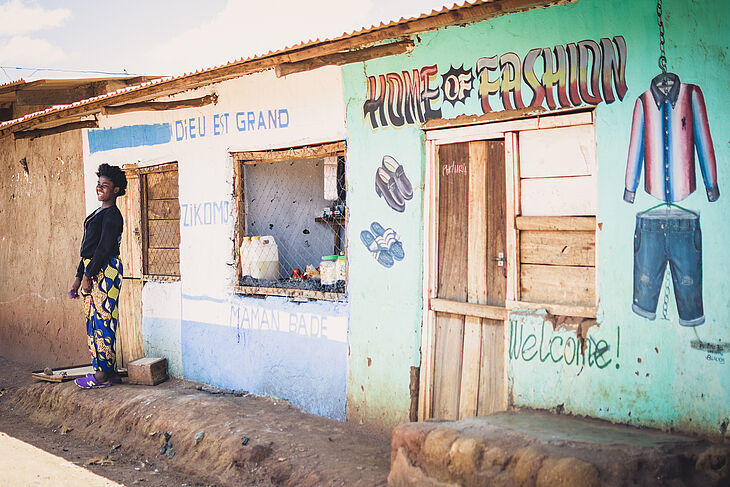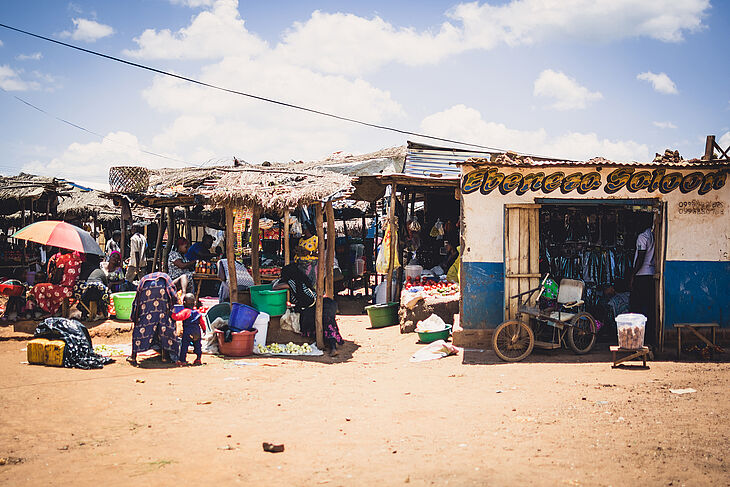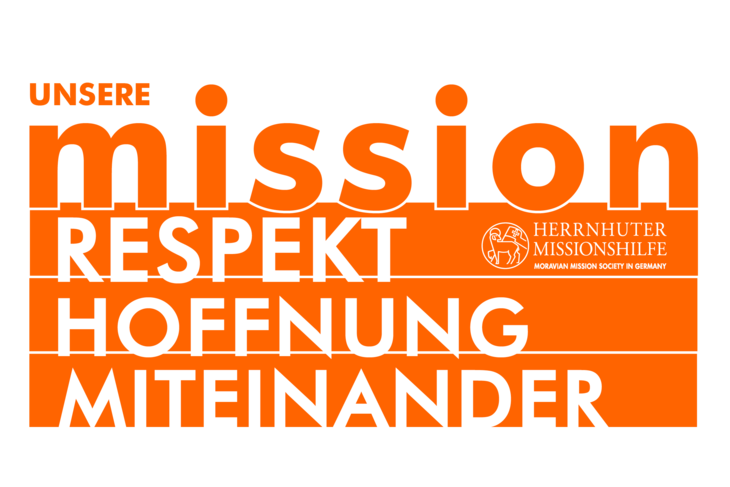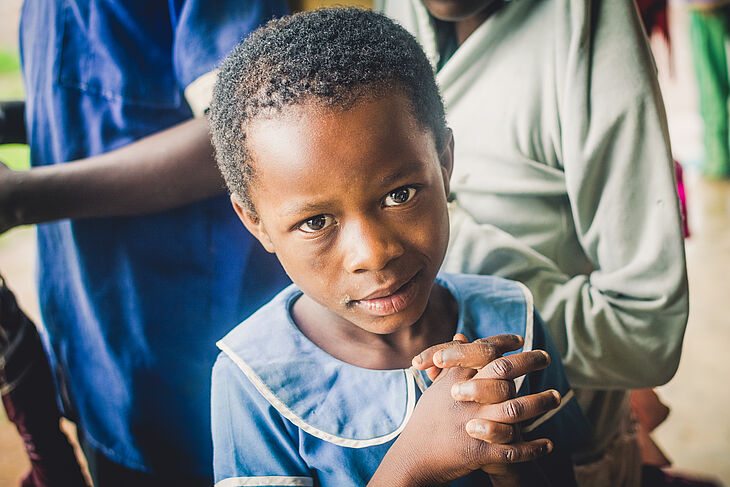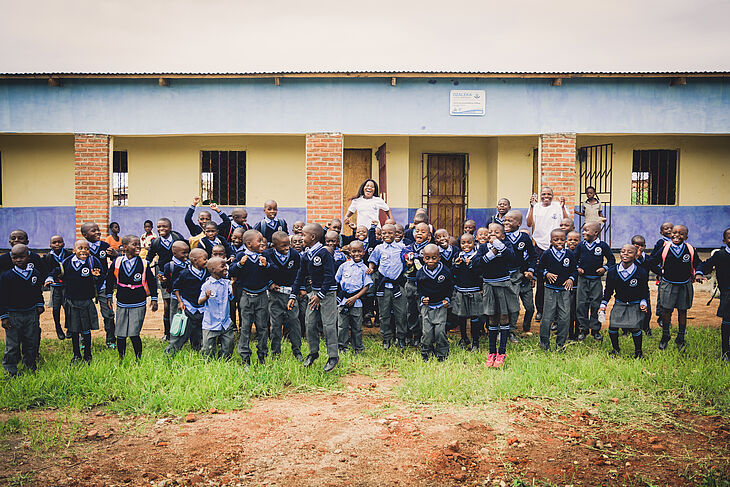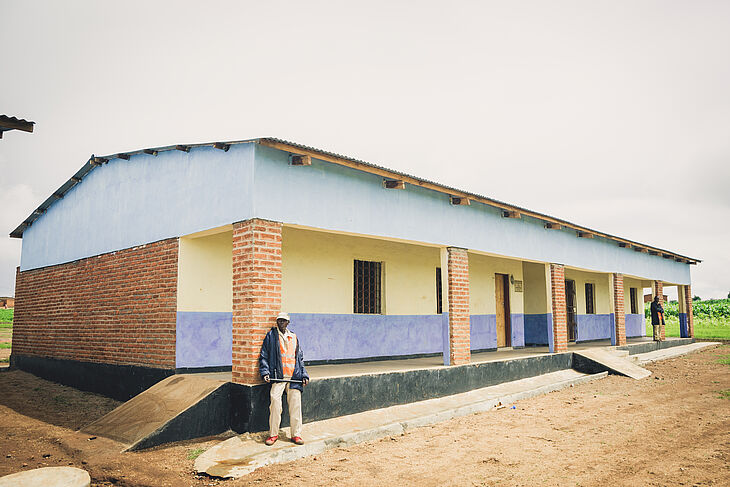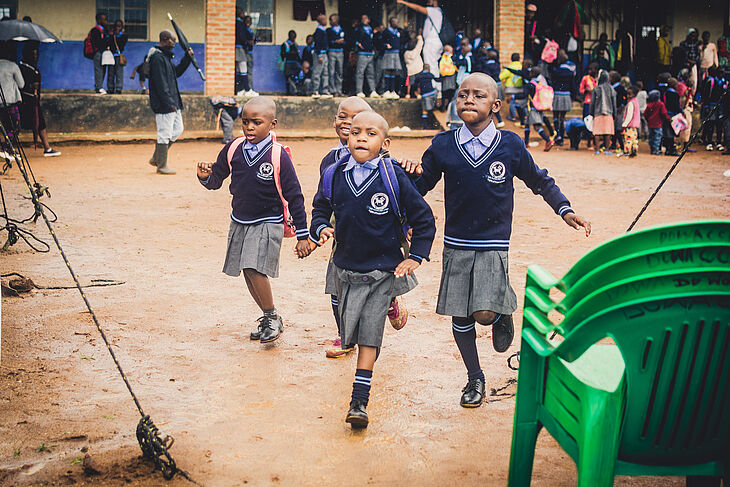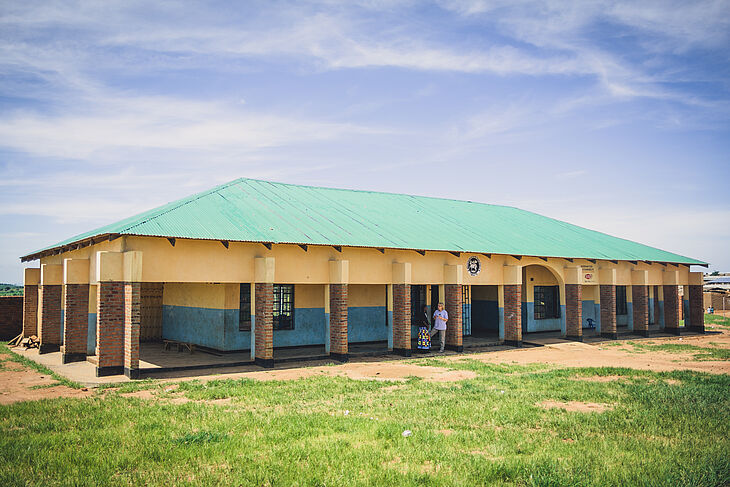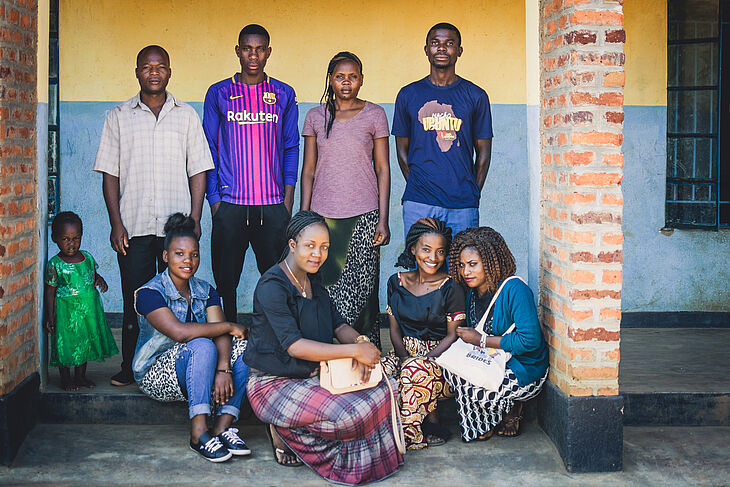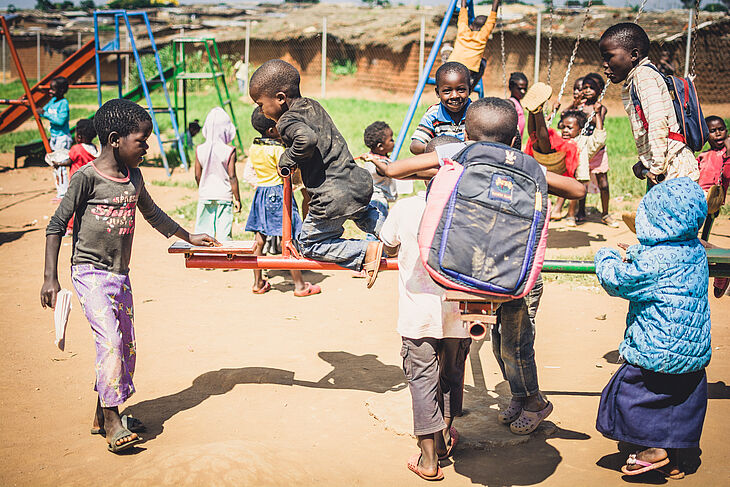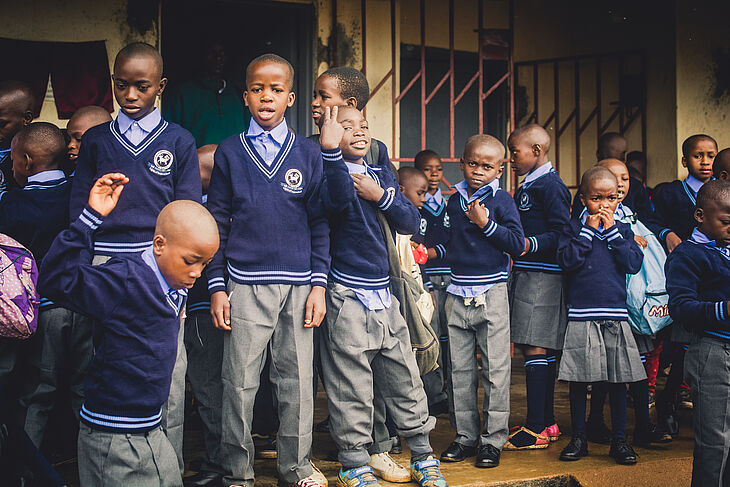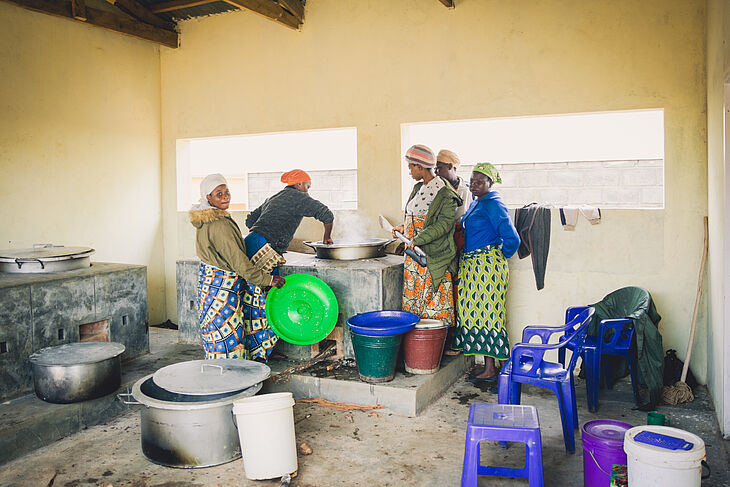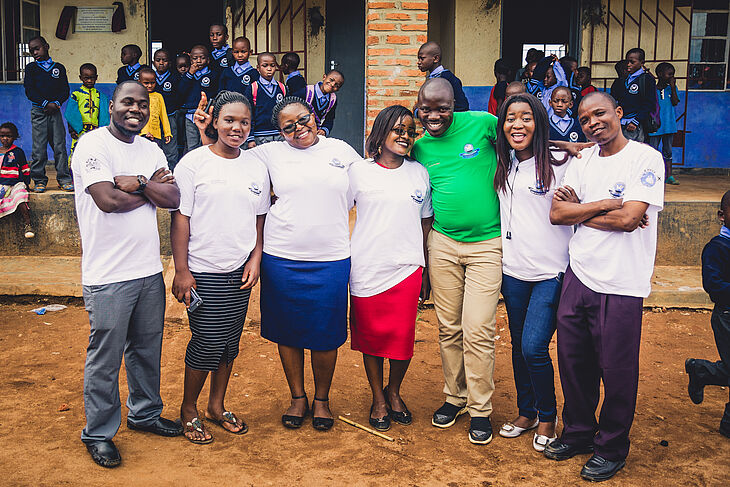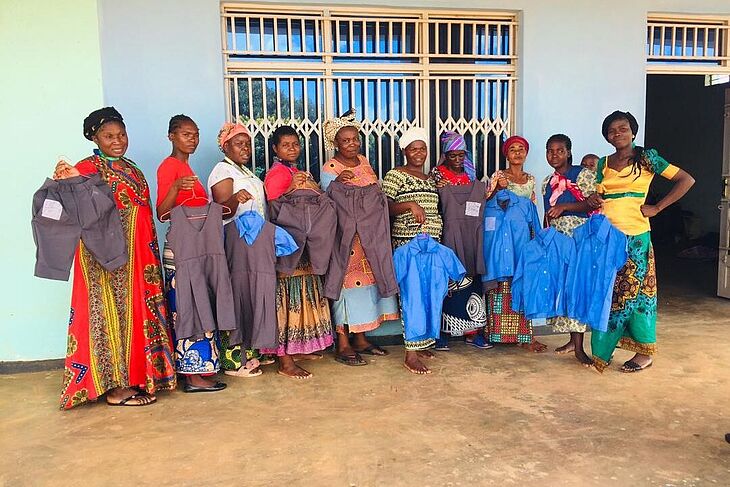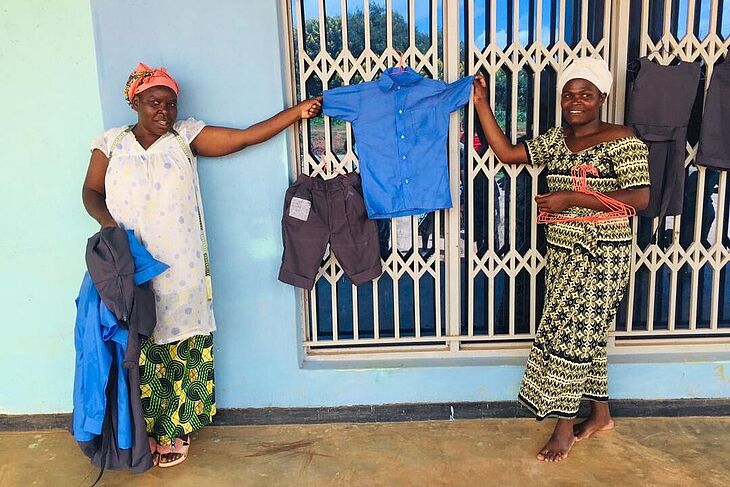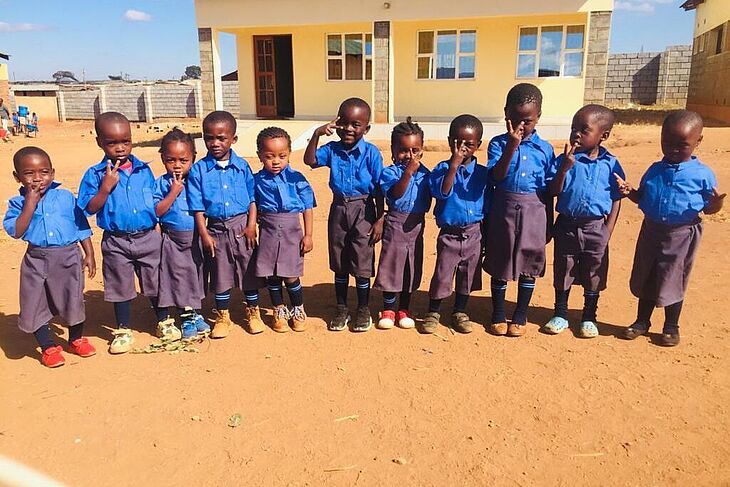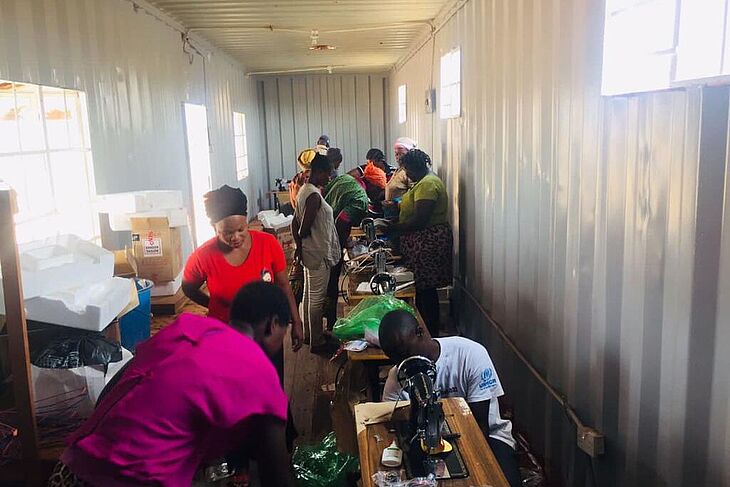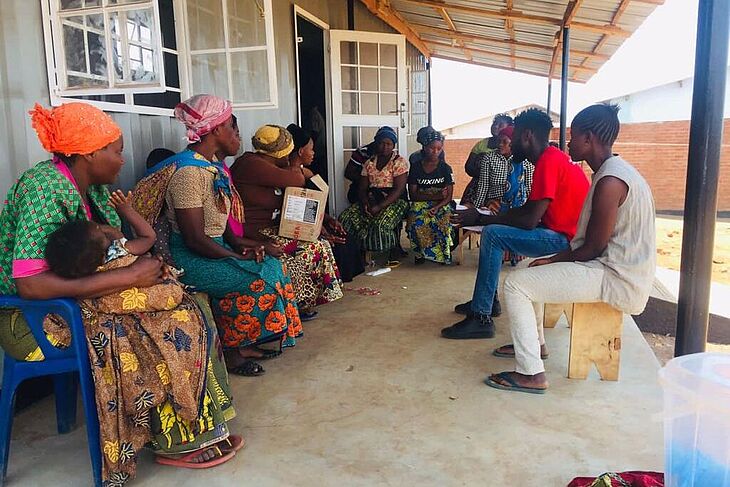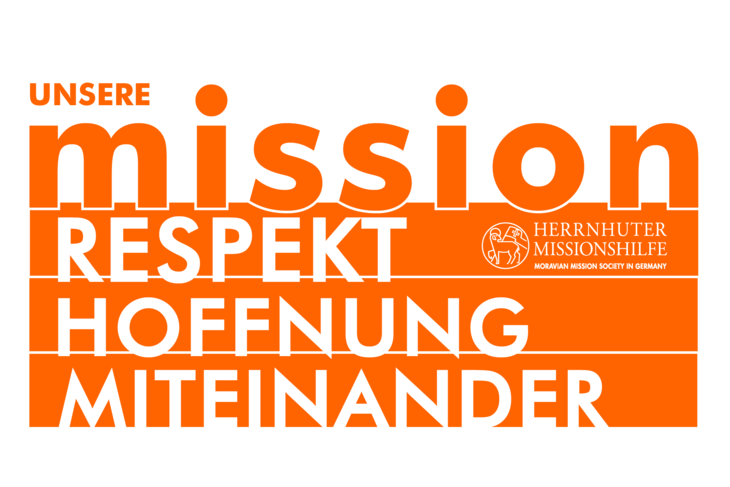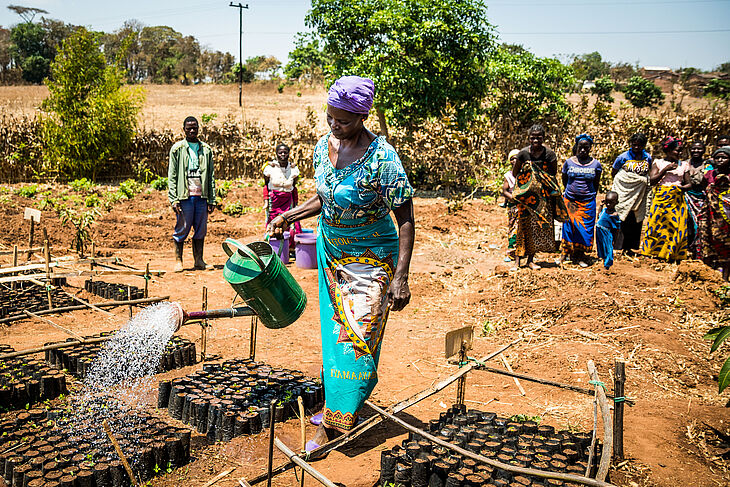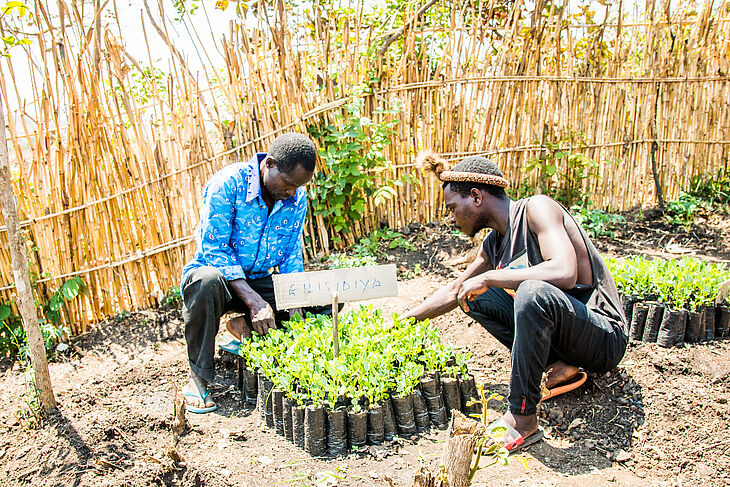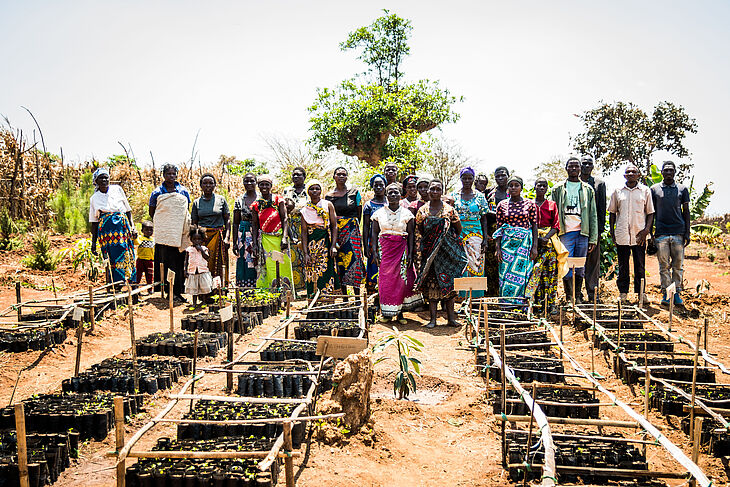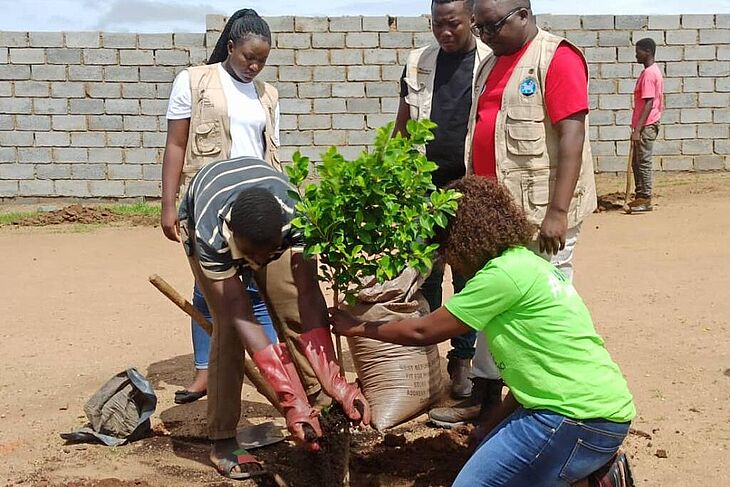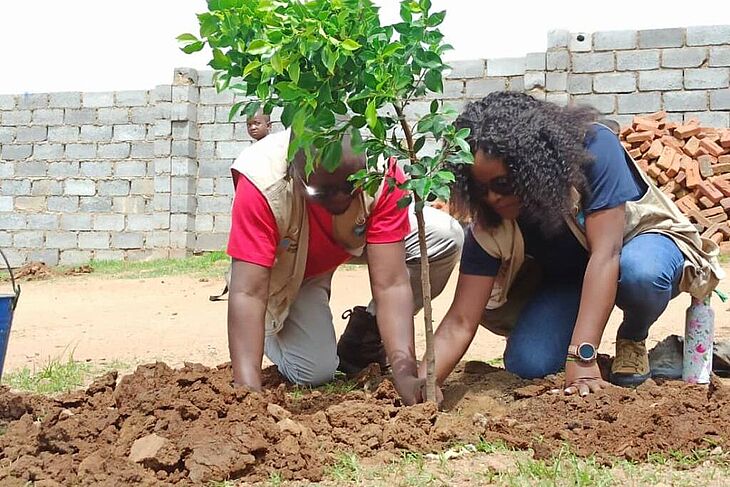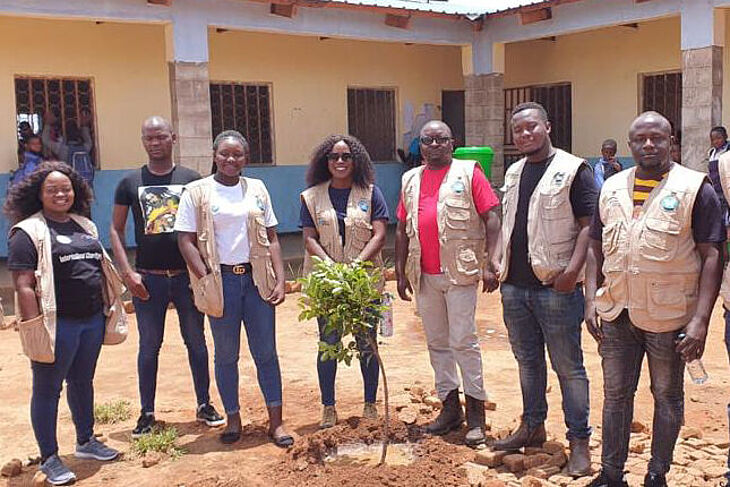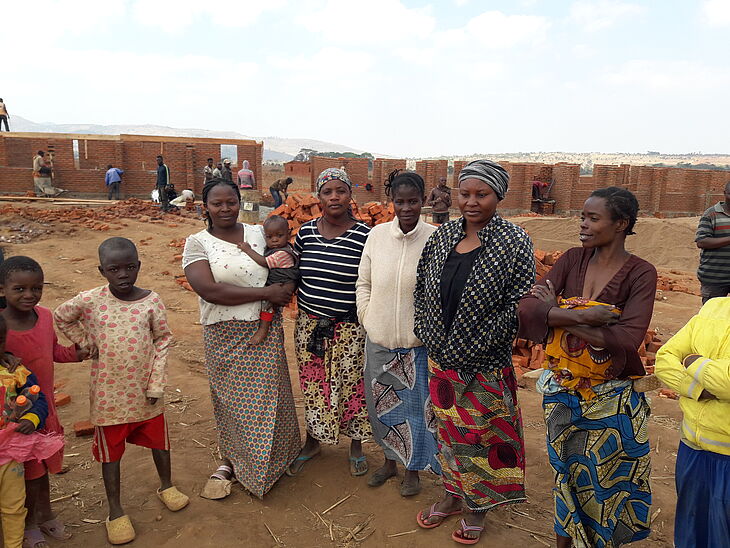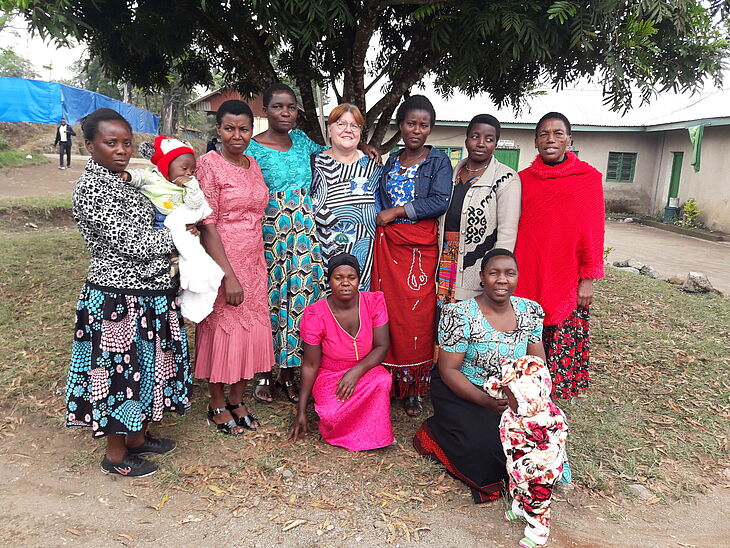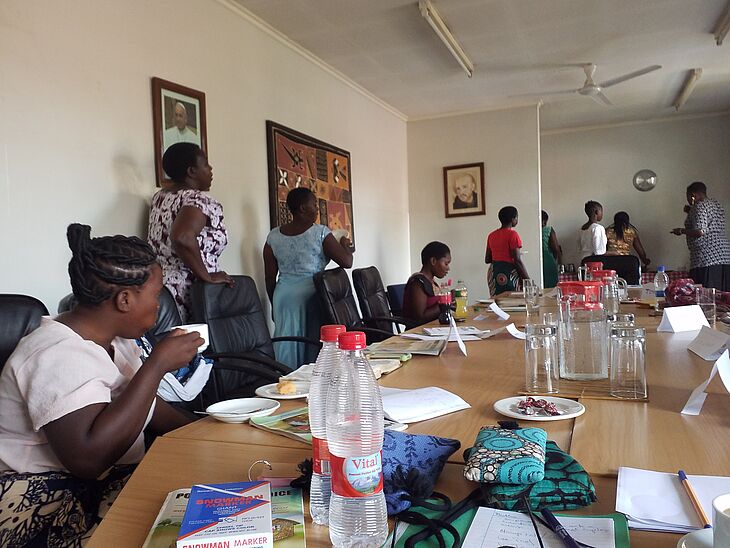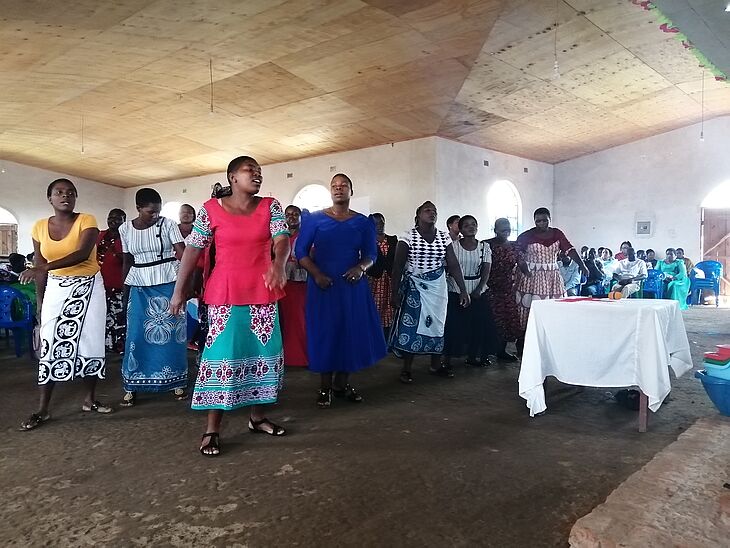Malawi

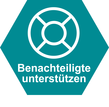



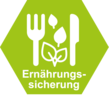
Malawi
Malawi is one of the small countries in Africa. With 120,000 km², it is about the size of eastern Germany. The country is characterized by the elongated Lake Malawi (formerly Lake Nyassa). The population of Malawi lives to 80% from subsistence agriculture. It is estimated that 1/3 of the people cannot adequately meet basic food needs. Women do most of the work in the household, raise the children, cultivate the fields and are responsible for feeding their families.
News from the projects
Greetings from Jonah Sinyangwe from Malawi
The mission festival of the Moravian Church on September 20, 2025, in Zeist also focused on the work of the Moravian Church in the Dzaleka Refugee Camp, a UNHCR camp near Lilongwe in Malawi. The camp was originally planned for 10,000 people and now houses 65,000. The long-time director of the work there, Jonah Sinyangwe, director of MoHDevS (= Moravian Humanitarian and Development Services), was not personally present at the mission festival, but sent a video greeting. See here. Meanwhile, the Moravian Church in Malawi—supported primarily by the Herrnhuter Missionshilfe—maintains several facilities in the camp, which are mostly attended by refugees from Rwanda, Burundi, and the Democratic Republic of Congo. See here.
Practical learning with a future: New clay oven at the AWTC
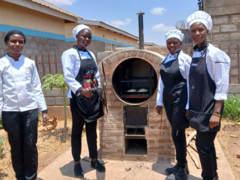
The Atsikana Walani Training Center (AWTC) in Malawi recently acquired a very special helper: a brick clay oven that trainees in the food production program can now use to bake bread, pastries, and many other dishes—without any electricity or gas. Since energy sources in Malawi are currently extremely expensive and often unreliable, this oven is much more than just a technical innovation. It stands for sustainability, independence, and practical learning with local resources. The young women are learning firsthand how simple means can have a big impact – knowledge that will benefit them not only in the classroom, but also in their future everyday lives and on their path to independence. The oven was built thanks to targeted support and donations – an example of how quickly and effectively help can arrive when many people pitch in. Many thanks to everyone who made this project possible!
Voices from Malawi on the 2025 election
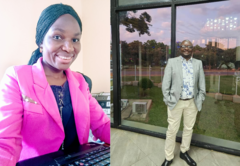
The ongoing elections in Malawi are a moment of great hope for many people in the country. The Herrnhuter Missionshilfe organization discussed the topic with the team from MoHDevs and with students from the Atsikana Walani vocational training center for women. The desire for better education and health care, more job opportunities, and stable economic development was often mentioned. Young people, who make up the majority of the population, are seen as the driving force for change—reinforced by the growing number of young candidates. The role of women is also in focus: more female leaders are needed to promote equality and bring new perspectives to politics. At the same time, there are concerns about low voter turnout, lack of information, and possible conflicts over the results. Despite these challenges, the desire for a united Malawi that seizes its future opportunities and puts the well-being of its people above party political interests prevails.
Dzaleka in need – Light of Hope school fights for survival
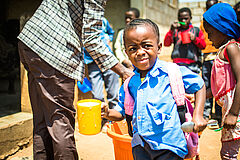
The withdrawal of the UNHCR is hitting the Dzaleka refugee camp in Malawi hard – and directly affecting the Light of Hope school, which is jointly run by the Moravian Church Malawi, MOHDEVS and the Herrnhuter Missionshilfe. The background to this crisis is the drastic cuts in US funding for UN organisations under the Trump administration. The UNHCR also lost important funds at that time – with devastating consequences that continue to this day. More than 70,000 refugees now live in the camp. The situation is dramatic: there is a lack of food, clean water, shelter and medical care. Amidst this emergency, the school is a place of hope. Over 1,000 children receive education, a warm meal and a sense of security here. ‘The school is more than a place of learning – it is hope in the midst of crisis,’ says a local teacher. Please help ensure that Dzaleka is not forgotten – by sharing this situation and raising awareness.
“Safe Space” Project - Protection and prospects for refugee girls from the Congo
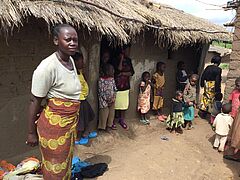
In the Dzaleka refugee camp, which has long exceeded its capacity, thousands of people from crisis regions such as the Democratic Republic of Congo are seeking protection – many of them young women who have experienced violence and exploitation during their flight. Life in the camp is particularly dangerous for them. Together with MoHDevS, the local partner of Herrnhuter Missionshilfe, the Atsikana Walani Technical College has launched a “Safe Space” emergency aid program: 20 girls are provided with a safe haven offering accommodation, food, and psychosocial support. In a protected space (“Safe Space”), they can find peace, talk about their experiences, and gain new strength. At the same time, the young women are given access to education and vocational training – for example in tailoring, electrical engineering or solar technology. The aim is to give them long-term prospects and economic independence. This pilot project goes beyond mere emergency aid: it provides protection, strengthens self-confidence and opens up concrete opportunities for the future – for a life in dignity.
Baking without electricity – donations sought for a brick oven for training at the AWTC
At the Atsikana Walani Technical College (AWTC) in Malawi, young women receive practical training in food production. Bread and pastries are just as much a part of the curriculum as hygiene, ingredient knowledge, and economic efficiency. However, one key element has been missing until now: a suitable oven. An electric oven is out of the question – the AWTC is not connected to the public power grid, and solar technology alone is not sufficient for continuous operation. The plan is therefore to build a brick outdoor oven that can be fired with briquettes. This would not only enable continuous training, but also be used to feed the students and staff and contribute to self-sufficiency. Bread and pastries can also be sold at the market, generating a small income for the next food purchases. Around €900 is needed for the construction, plus funds for the initial purchase of fuel. We are therefore looking for supporters who can help make this dream come true for the young women. With your donation, you will help make the vocational training at the AWTC practical and future-oriented.
Construction of a well at the Light of Hope School: Access to clean water in Dzaleka Camp
A deep well with a solar-powered water pump is currently being constructed in the Dzaleka refugee camp in Malawi – an urgent project given the dramatic supply situation on site. The camp, originally designed for 10,000 people, now has over 60,000 inhabitants. Hygienic conditions are catastrophic and the existing water supply is completely inadequate. In addition, Malawi is one of the countries particularly hard hit by the effects of climate change. Recurring droughts are exacerbating the already severe water shortage – the situation is extremely stressful, especially for children and women, who are often responsible for fetching water. The new well will be built on the grounds of the Light of Hope School run by the Moravian Church. With large storage tanks, ten water extraction points, a septic tank, and a trained local management team, it will provide reliable clean drinking water for many families in the camp in the future – even during the increasingly frequent dry seasons.
Digital opportunities for girls in Malawi: tablet collection campaign for the Walani Women Center
Atsikana Walani Technical College in Malawi will soon have a small school library that combines traditional books with digital learning media. The aim is to give young women access to modern education - including in professions that require technical know-how. While digital schooling has become a matter of course in many countries, it is still out of reach for many girls in rural regions of Malawi. However, digital education in particular opens up new opportunities: it enables individualized learning, promotes digital skills and creates prospects for training and careers. In cooperation with the handball players of FrischAuf Frauen Göppingen and the Werner-Heisenberg-Gymnasium Göppingen, Herrnhuter Missionshilfe is collecting well-preserved or new tablets with chargers and up-to-date software (to the call for donations here). The devices are used locally as a digital school library - a low-threshold access to knowledge that specifically promotes girls. Donations can be sent in until the end of June or handed in directly in Bad Boll: Herrnhuter Missionshilfe, Project “Walani”, attn. Markus Kuhn, Badwasen 6, 73087 Bad Boll. Every tablet counts - for education, participation and a better future.
Strengthening practical training: New workshop for sanitary installation at the AWTC
A new workshop for plumbing training is currently being built at the Atsikana Walani Training Centre (AWTC) in Malawi. The foundations have already been laid, thanks to financial support from the Dutch partner organization ZZG. Plumbing is one of the skilled trades that is still heavily dominated by men in many countries. The AWTC is committed to training young women in such fields in a practical, qualified, and future-oriented manner. The new workshop is an important step toward opening up concrete career prospects for young women from disadvantaged backgrounds, including girls from the nearby Dzaleka refugee camp. Through practical training, they have the opportunity to acquire craft skills, gain self-confidence, and secure their own livelihood in the future.
New gardening project for women in Mzuzu
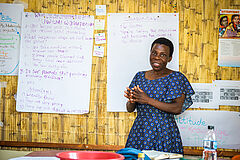
Lilian Nyirenda joined the team at the Women Training Center in Mzuzu in February. In her new role, she coordinates income-generating measures for women, among other things. This week, she organized a first meeting with five participants to launch a new horticultural project. The focus is on growing and processing tomatoes. The aim of the project is to create a long-term source of income for the women involved. Other interested women have already signaled their participation. Infrastructural challenges are also being addressed: As the current water supply is not sufficient, the existing borehole is currently being deepened by three meters. This should provide sufficient water for agricultural operations in the future. The project is a further step in the expansion of practical training and income opportunities for women in the region.
Handmade book covers from AWTC
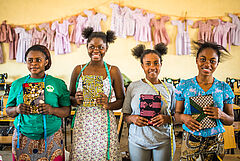
With great care and attention to detail, the trainees at the AWTC training center in Malawi produce stylish book covers for notebooks - each piece is unique. The hand-sewn covers are not only a beautiful accessory, but also part of an income-generating measure that contributes to the financial independence of the young women. A book cover - together with a matching notebook and a lovingly designed postcard - can be purchased for a donation of around 8 euros (including postage). The covers will also be available at the Herrnhuter Miisonshilfe stand at the Kirchentag. By purchasing them, you are not only supporting creative education, but also promoting education, independence and sustainable development on the ground. If you are interested, please send a message to: markus.kuhn@ebu.de
High-ranking visitor at Walani College: Ambassador Ute König visited the vocational training center for girls
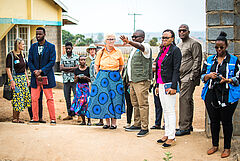
A very special day at Atsikana Walani College and a highlight of the Herrnhuter Missionshilfe (HM) project trip to Malawi: in addition to the German ambassador Ute König, important representatives from UNHCR, TEVETA, the Malawi University of Science and Technology (MUST) and the police were also present in mid-October. Everyone was enthusiastic about the work that is done here every day to enable young women to have a better future through education. For the girls, but also for the HMH staff, it was an unforgettable highlight that once again emphasized the importance of education and training. The local project partner, MoHDevS, was also highly praised for its commitment. A day full of inspiration and appreciation for everyone! Here is a brief overview of the people present: HE. Ute Konig - German Ambassador, Roberline Flore Tozwen Teunkwa - UNHCR Senior Protection Officer/Deputy, Priscilla Kalumo - UNHCR Education Associate, Gloria Nyang'iye - UNHCR Public Relations, Elwin Sichiola - TEVETA Executive Director, Dr. Duncane Batizani - MUST Deputy Registrar - Academics, Dr. Bonet Kamwana - MUST Senior Lecturer, Dr. Petros Chigwechokha - MUST Senior Lecturer, Superintendent Mwakasyaya - Station Officer Lumbadzi Police.
Project from the women's work of the Moravian Church in Malawi officially launched
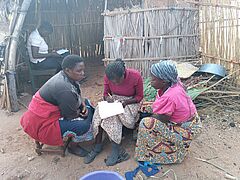
The first women's project of the Moravian Church in Mzuzu, Malawi has now officially started. There is an active Moravian Congregation in Lumbadzi, 20 kilometres north of Mzuzu. Under the name "Our hope, our business", 18 women started a sewing and handicraft group with great support from the congregation. They were equipped with sewing machines and have been trained in business management for over a year. In addition, numerous meetings and creative sessions were held to discuss topics such as customer acquisition and goals. Rev Juliana Miamba and Kristin Hentschel see the project as a great opportunity for the women to generate their own income in the near future and thus take a first step out of poverty. Good luck!
Become a sponsor for the "Walani" project
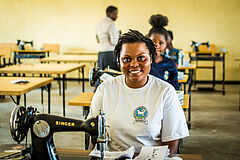
The Atsikana Walani Technical College in Malawi offers young women a safe place to live and the opportunity for vocational training. Many of the trainees come from the UNHCR refugee camp Dzaleka. With a sponsorship, you enable a girl from the Dzaleka camp or the surrounding villages to receive vocational training at Walani College. It covers the costs of training, accommodation, food, basic medical care, school materials and access to clean water. Our local partners look after the women during their 12-month training. As a sponsor, you accompany a young woman during this time and receive letters and photos. The cost of a sponsorship is 60 euros per month. But even smaller amounts can help. For further information, please contact markus.kuhn@ebu.de
The Dzaleka Camp
Malawi, a country suffering from hunger itself, has agreed to take in refugees from Congo, Burundi and Rwanda. The UNHCR refugee camp Dzaleka (near the capital Lilongwe) is currently home to more than 70,000 refugees, about 55% of them are children and young people under the age of 18.
There are only limited places in schools. More than half of the children and young people have no access to education. Food rations are often not enough for all, space to grow corn or rice in the surrounding area is limited and reserved for those who have money for seeds. In their country of origin and during the escape, the refugees usually experienced terrible and dangerous situations (bodily harm, sexual abuse, emotional torment).
Many women and children are widowed and orphaned because their husbands and parents were cruelly murdered. They lost their savings and possessions.
This plight of the refugees in the UNHCR Dzaleka refugee camp has greatly moved the Moravian Church Malawi. They have decided to provide support together with Herrnhuter Missionshilfe and support from individual and major donors, as well as foundations and organizations.
The church wants to help these refugees sustainably with various measures and offer a perspective for the future. On Sundays, there are church services on the premises and a Sunday school for children.
Project Pictures
in the Dzaleka Camp - Light of Hope School
The Child Care Center of the Moravian Church in Malawi was opened in 2017 on the outskirts of the Dzaleka refugee camp in Malawi. 250 children of primary school age are looked after in the mornings by so-called volunteer Care Givers. These are young people from the camp and surrounding villages who have been trained by the government and UNHCR in dealing with children. They offer the children basic education in reading, writing, maths as well as English. There is a playground on the premises and the children receive a hot meal every day. In the afternoons, the center is used by 150 primary school students who do not have the opportunity to attend school. They also come from the camp and from the surrounding villages. The volunteer Care Givers teach the children as well as they can and offer them a change in their dreary everyday life as refugees.
Thanks to the great support of additional donors, we were able to start the construction of more buildings in the summer of 2019. Already in January 2020, the elementary school Light of Hope could be inaugurated. It offers over 800 children from the camp and the surrounding villages the opportunity of a primary education. They also receive a daily meal. The government provides the teachers and should also pay for the school materials. Unfortunately, there are no financial resources available for this at the moment, so Herrnhuter Missionshilfe has bought books for the majority of the teachers, students and has provided the children with school uniforms. In addition, there are 6 teachers' houses on the premises as well as a large sports field. Due to the still great demand, Herrnhuter Missionshilfe will also try to further expand the project in the future with the support of donors.
Project Pictures
Target groups
The target groups are disadvantaged and vulnerable refugees, especially children of preschool and primary school age between 3 and 14 years in the UNHCR refugee camp and surrounding villages.
Support is provided regardless of gender, ethnicity and nationality.
Project goals
- The Child Care Center and the primary school Light of Hope give children access to education and thus a chance for a future worth living.
- The sustainable improvement of the living conditions of refugees and children through a daily meal and basic medical care
Activities
- Daily meals for children
- Scholarship programs, continuing education for young refugees
- Care and activities for children
- Design of the playground with additional playground equipment
- Sunday school
Project progress
The work among refugees in Malawi at the UNHCR refugee camp has expanded greatly. Since 2016, Moravian Church Malawi has been involved and supports 250 kindergarten children and over 800 primary school students in various areas.
Reliable structures have been built and many programs have been established to support especially disadvantaged children and give them a future worth living.
They receive one meal a day and basic health care. The health of these children improved thanks to a balanced diet.
In Sunday school they sing songs and listen to Bible stories. This helps the children in their extremely difficult situation and there are people by their side who stand by them and listen to them.
Project Managers and Project Partners
Bettina Nasgowitz | Markus Kuhn |
| Tel. +49 (0)7164 9421-22 bettina.nasgowitz@ebu.de | Tel. +49 (0)7164 9421-23 markus.kuhn@ebu.de |
in cooperation with
Moravian Humanitarian & Development Services
Moravian Church Malawi
Zeister Zendingsgenootschap (ZZg)
in the Dzaleka Camp - Women Sewing Project
More than 70,000 refugees currently live in the Dzaleka refugee camp near the Malawian capital Lilongwe. Among them are many women and children who have fled here from surrounding countries such as Rwanda or the Congo.
In February 2021, the Women's Sewing Project Light of Hope Tailoring Shop started in the middle of Dzaleka Camp. The project gives women from the camp the opportunity to use their talents at the sewing machine to generate income while providing uniforms for the children at the Light of Hope School. The project is accompanied and supervised by Belinda Gondwe, an employee of our partner organization Moravian Humanitarian & Development Services MoHDevS.
At the moment, most of the children still come to school with dirty and broken clothes. Clean and uniform clothing is immensely important and increases the children's self-confidence. It motivates them and they feel secure in the community.
In the meantime, thanks to numerous donations, it has been possible to buy a building of their own, in which the now more than 10 women make not only the uniforms, but also other items of clothing. These can then be sold profitably at the markets in the camp and in the surrounding area.
Project Pictures
Project Managers and Project Partners
Bettina Nasgowitz | Markus Kuhn |
| Tel. +49 (0)7164 9421-22 bettina.nasgowitz@ebu.de | Tel. +49 (0)7164 9421-23 markus.kuhn@ebu.de |
in cooperation with
Moravian Humanitarian & Development Services
Moravian Church Malawi
Sustainable Agriculture
Background
Around a fifth of the Malawian population is chronically malnourished. Around a third of young children suffer from stunted growth due to malnutrition (source: BMZ). In view of the current shortage of seeds and fertiliser, experts are warning of a food crisis in the south-east African country.
Poverty is affecting the poorest sections of the population in particular, primarily smallholder farmers, as a large part of the population in Malawi lives from subsistence farming. However, agriculture in Malawi faces enormous challenges: Extreme weather such as heavy rainfall and drought are becoming more frequent due to climate change. This results in long periods of drought or flooding that inundate fertile farmland and wipe out a year's harvest. As recently as March 2023, Cyclone Freddy caused entire villages and fields to sink under mudslides. A later onset of the rainy season, as has been the case in recent years, also has serious consequences for farmers and threatens their livelihoods. Extreme weather-related crop failures, rising food prices and contaminated drinking water cause food shortages and malnutrition. Children are particularly affected by the consequences. UNICEF warns that at least 573,000 children under the age of five in Malawi are at acute risk of malnutrition.
In addition to extreme weather, high population growth and the associated deforestation, which results in a sharp increase in soil erosion and leaching of the humus layer, also contribute to food shortages. It is hardly possible to grow food on these fields any more.
The area around the UNHCR refugee camp Dzaleka in Malawi, which is currently home to over 70,000 refugees, 55% of whom are children and young people under the age of 18, is severely affected. The strong population growth in the Dzaleka camp has led to the residents cutting down trees and bushes for firewood and charcoal as an additional source of energy. The consequences of deforestation are manifold: there is considerable soil erosion and flash flooding, especially during the rainy season, there are hardly any trees to provide shade or trees/hedges to serve as windbreaks, and the land remains barren and inhospitable. However, not only the inhabitants of the camp are affected, but also the communities on the outskirts of Dzaleka Camp who are losing their livelihoods as small farmers.
In order to avoid conflicts, it is therefore important to strengthen the communities' resilience to the effects of climate change and the associated extreme situations. Only by working together will the communities be able to arm themselves against crop failures and other crises and become less dependent on external aid. It is therefore important to support the residents in their endeavours. Through education and training in sustainable farming methods and sustainable agriculture, income-generating measures, but also in access to clean drinking water, the supply of drought-resistant seeds, working materials and a reliable water supply for year-round irrigation of the fields.
Project preparation
In order to support local residents and farmers in securing their livelihoods, HMH e.V. and its project partner MoHDevS launched the "Tree Nursery" project around 1.5 years ago with the aim of strengthening the resilience of the communities. Several local initiatives were founded in and around Dzaleka Camp and trained in sustainable cultivation methods and the cultivation of tree and shrub seedlings. In addition to specialists, students from Lilongwe University are also involved in the training, which takes place at regular intervals. The aim of this initiative is to pass on knowledge to various population groups in a sustainable manner and to learn practical skills in order to bring about a lasting change in the population.
Tree nurseries with numerous different tree seedlings, including drought-resistant and fruit-bearing ones, have been established in several villages and at the school centre and have been cared for and cultivated in recent years. The groups are now well trained in the cultivation and care of seedlings. Through HMH e.V. and MoHDevS, they receive both expert advice and support in procuring additional high-quality seeds and natural fertiliser.
The biggest challenge, however, is watering the seedlings during the long dry season. A solar-powered irrigation system would enable the working groups to raise around 25,000 tree seedlings and grow vegetables all year round for food security. The climate in the area around Dzaleka Camp is ideal for growing tomatoes, onions, potatoes, peppers, beans, maize and beans. In addition to self-sufficiency with healthy vegetables and the associated food security, fields can also be cultivated where vegetables are raised for sale. In this way, the cultivation can serve as an income-generating measure, as the vegetables can be sold on market days in Dzaleka. This income secures and improves the standard of living of the residents in the long term.
Project goal
The aim of the project is to sustainably strengthen the resilience of the inhabitants of the Dzaleka refugee camp and the surrounding communities and to arm them against the effects of climate change.
Target group
The target group of the project are residents/families of the Dzaleka refugee camp and surrounding villages as well as pupils of the Light of Hope and Atsikana Walani school centres.
Measures/activities
- Construction and installation of a solar-powered irrigation system
- Establishment of a "water committee" (involvement of villagers) and training of the committee in handling and maintaining the irrigation system
- Training and education of village working groups and imparting expertise on sustainable agriculture, irrigation and cultivation/rearing of tree seedlings, sustainable use of resources,
- Socio-economic strengthening of village structures
- Linking the village tree nurseries and selling the seedlings at public (garden/tree) markets at Dzaleka Camp (income-generating measures)
- Purchase of seeds and fertiliser for further tree nursery activities
- Briquettes instead of firewood project, avoiding deforestation and soil erosion by providing people with a "machine" for making briquettes as an alternative to wood, so that trees no longer have to be felled for firewood
Project Pictures
Project Managers and Project Partners
Bettina Nasgowitz | Markus Kuhn |
| Tel. +49 (0)7164 9421-22 bettina.nasgowitz@ebu.de | Tel. +49 (0)7164 9421-23 markus.kuhn@ebu.de |
in cooperation with
Moravian Humanitarian & Development Services
Moravian Church Malawi
Women Empowerment
80% of the population of Malawi lives on subsistence agriculture. It is estimated that 1/3 of the people cannot adequately meet basic food needs. Women do most of the work in the household, raise the children, cultivate the fields and are responsible for feeding their families. In the traditionally shaped society, they have hardly any opportunities for co-determination. Only about five percent of women attend secondary school. The illiteracy rate among women is therefore more than twice as high as among men. In addition, almost every family is directly or indirectly affected by HIV/AIDS, which means that women often have to take on additional care work. Family conditions are often characterized by poverty and violence.
Project Pictures
The Project
Empowering women and improving their situation is a key element for further development in Malawi. The Moravian Church Malawi has also recognized this. In the program Women Empowerment women are brought into contact with each other. Here they learn important know-how that supports them on their way to professional independence. Above all, however, they receive practical help in implementing their plans. To this end, the women in the program are empowered, i.e. made strong. They develop a start-up idea and become self-employed with their own small business. Promising businesses in the region are, for example, chicken or pig breeding, planting crops and, above all, sewing. To start their business, the women initially need a mini-credit to establish the business. However, training in general administration or courses in business management and marketing are also important to ensure that the start-up project really succeeds. Particularly effective are train-the-trainer programs, in which women themselves pass on the skills and knowledge they have acquired to other women.
An important aspect of the program is also to provide support in dealing with AIDS. This is because some women were already infected with the HIV virus at birth, and they are stigmatized or even completely excluded from their families. They are therefore forced to provide for the livelihood of their families all by themselves. In the Women Empowerment program, the women also receive knowledge on how to protect themselves from the disease and information on how to deal properly with people who already have the disease.
Target groups
Direct target groups are rural women who depend on an income to improve their living conditions, for example to support their families and send their children to school.
Project goals
- The project contributes to the improvement of the income situation of women in Malawi.
- Some of the women are to be trained as multiculturists, who will carry out independent training and counseling in the project regions in the long term.
Activities
- Development of income generating project ideas and a marketing strategy
- Construction of a women's center in Mzuzu/Malawi
- Granting of microcredits
Projct progress
Together with the local partner church, the Moravian Church Malawi, Herrnhuter Missionshilfe was able to support the work of Claudia Zeising with the help of many donors and supporters. She is an agricultural engineer and worked for 9 years in Rungwe/Tanzania as a project coordinator for Mission 21. She was able to start the first phase of the project Women Empowerment. With trainings to strengthen her own personality as well as in the areas of general administration, business management and marketing, the first basics have been taught. A second project phase is planned for 2020. With the deployment of a specialist, the following measures are to be implemented:
- Development of adapted training plans for female multipliers for commercial rabbit and chicken breeding, cultivation of saleable vegetables, sewing and textile processing.
- Development of adapted training plans for multipliers for planning and management of such income generating activities.
- Identification, recruitment and training of multipliers
- Accompanying the multipliers during seminars and trainings and supporting them in advising and assisting participants.
Since 2021, Kristin Hentschel has been working with women in Malawi in the area of training and consulting. Information about this is always available in the Herrnhuter Missionshilfe newsletter.
Project Managers and Project Partners
Bettina Nasgowitz | Markus Kuhn |
| Tel. +49 (0)7164 9421-22 bettina.nasgowitz@ebu.de | Tel. +49 (0)7164 9421-23 markus.kuhn@ebu.de |
in cooperation with
Moravian Church Malawi
